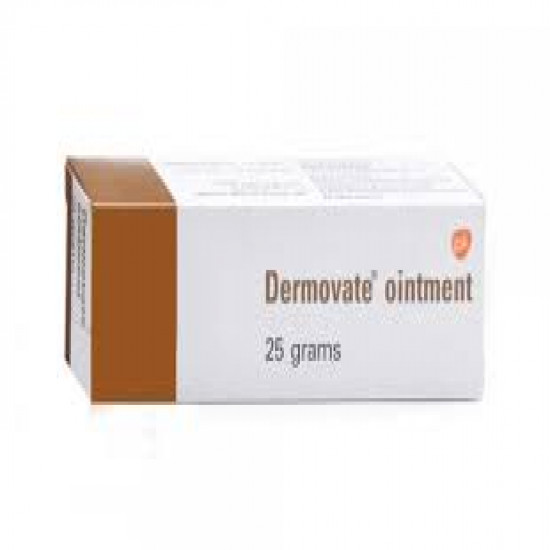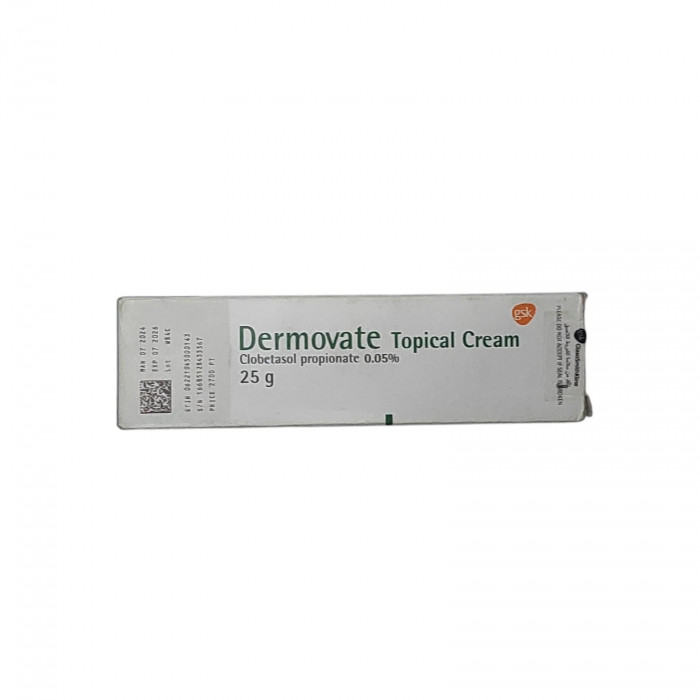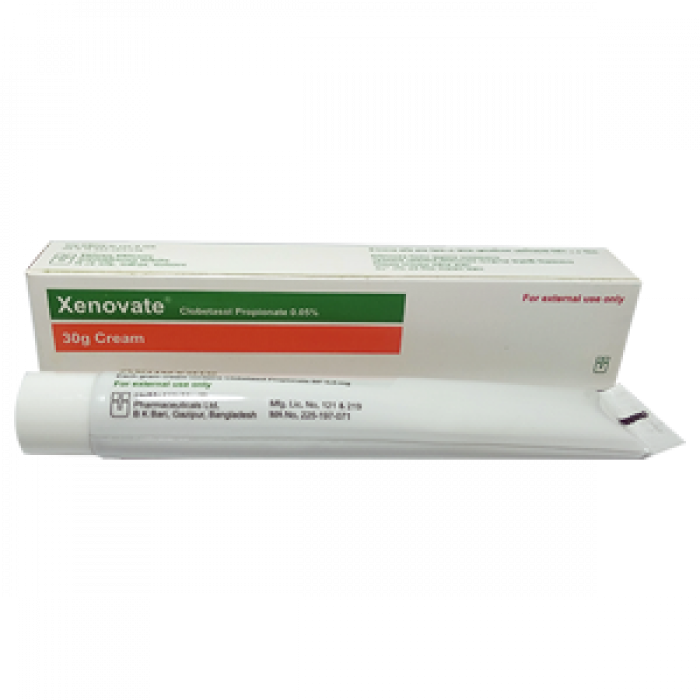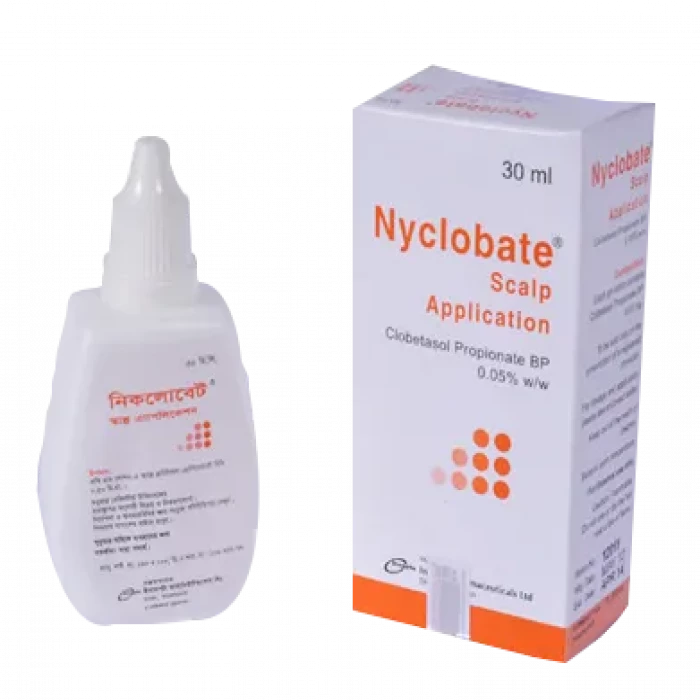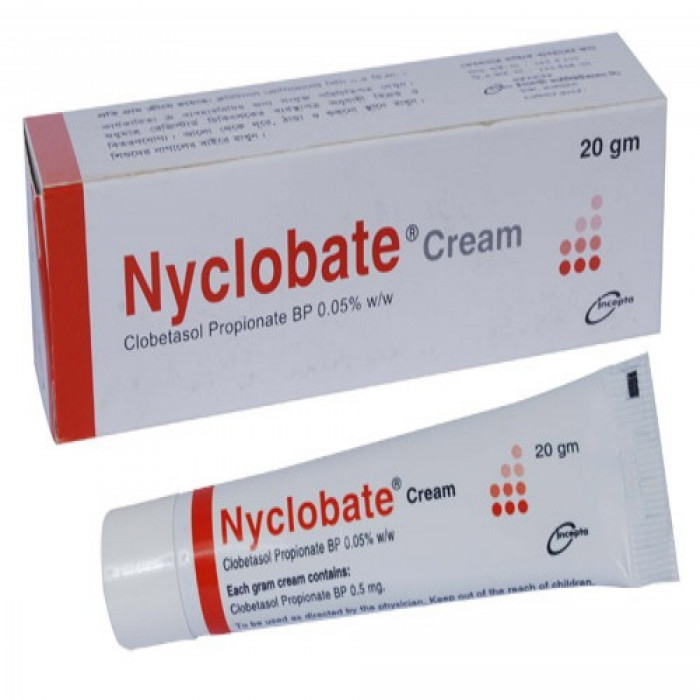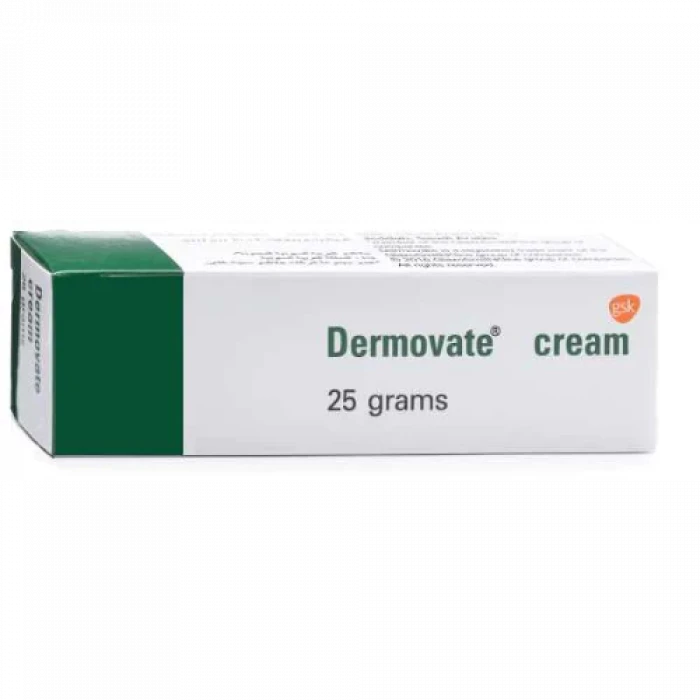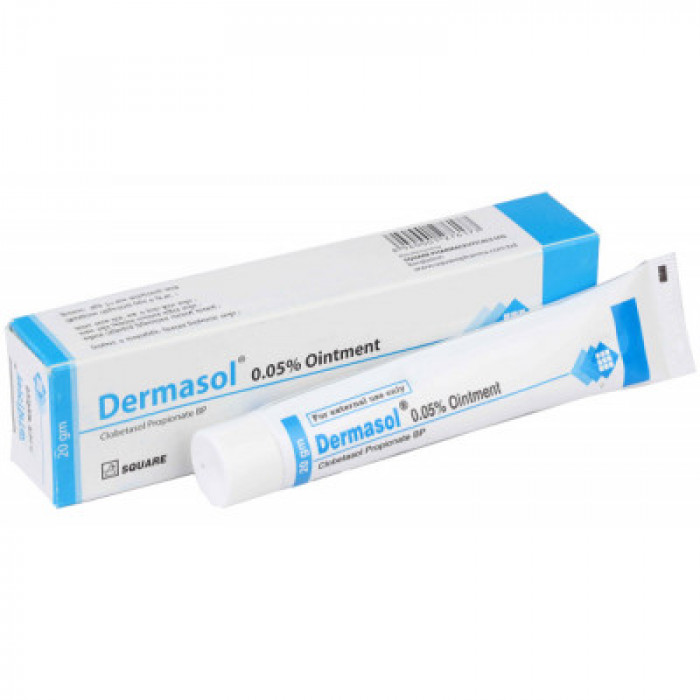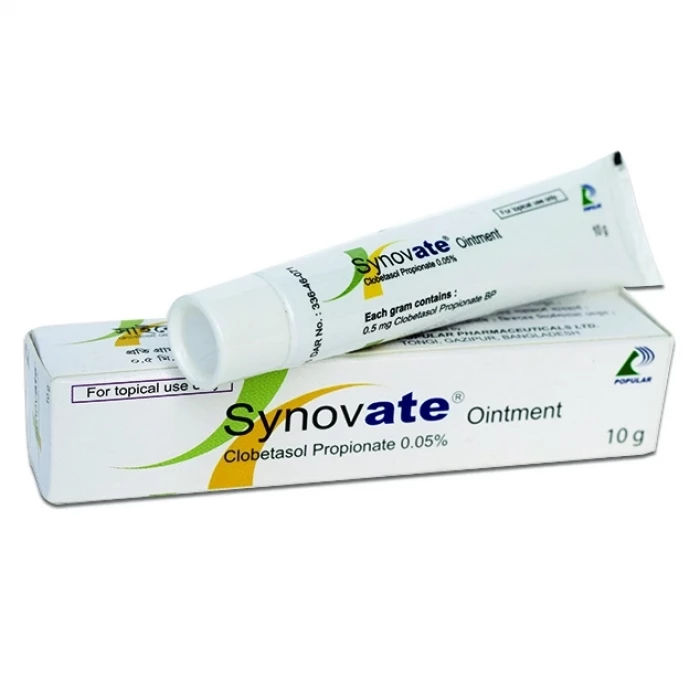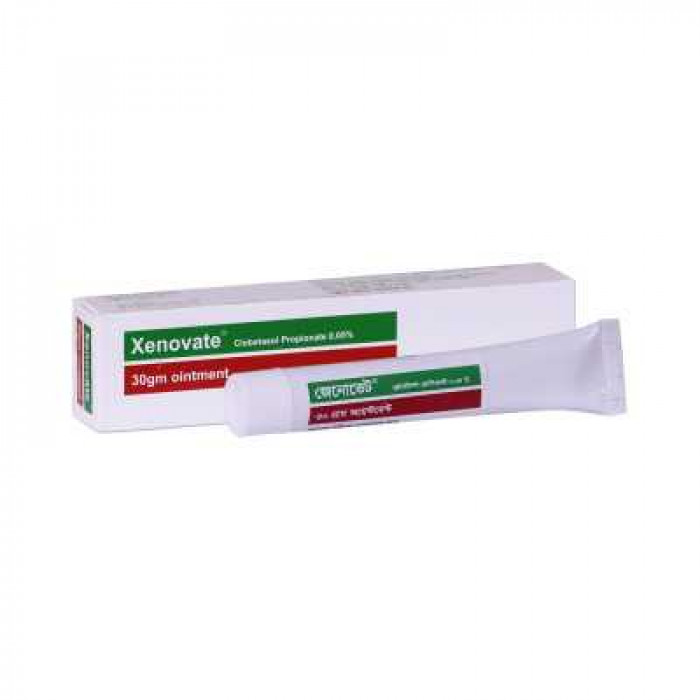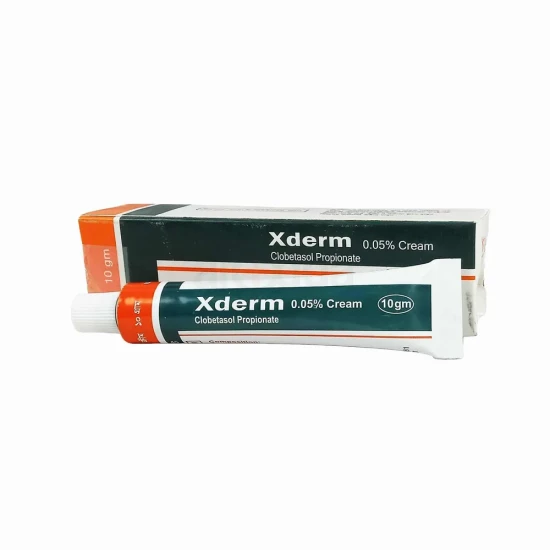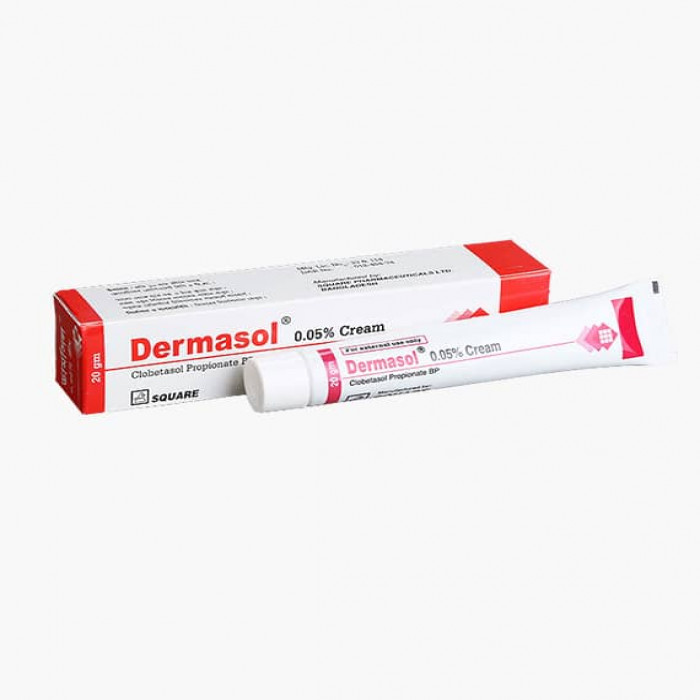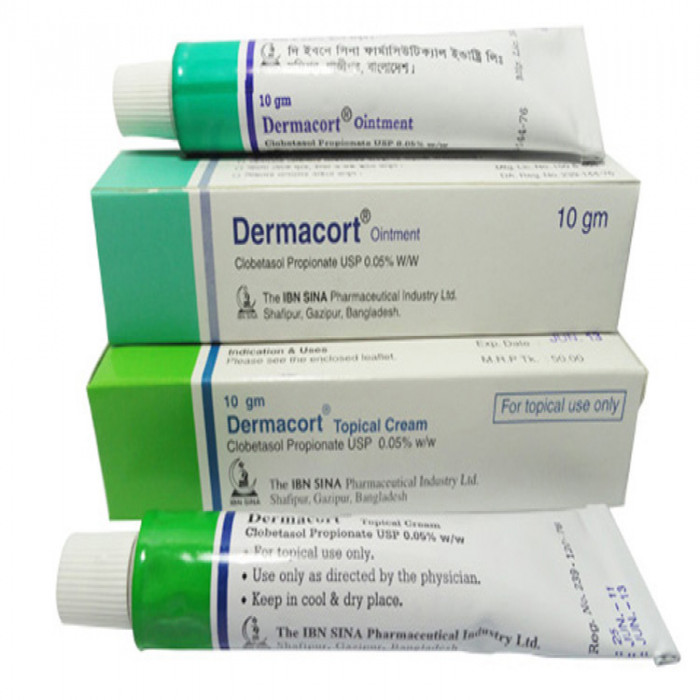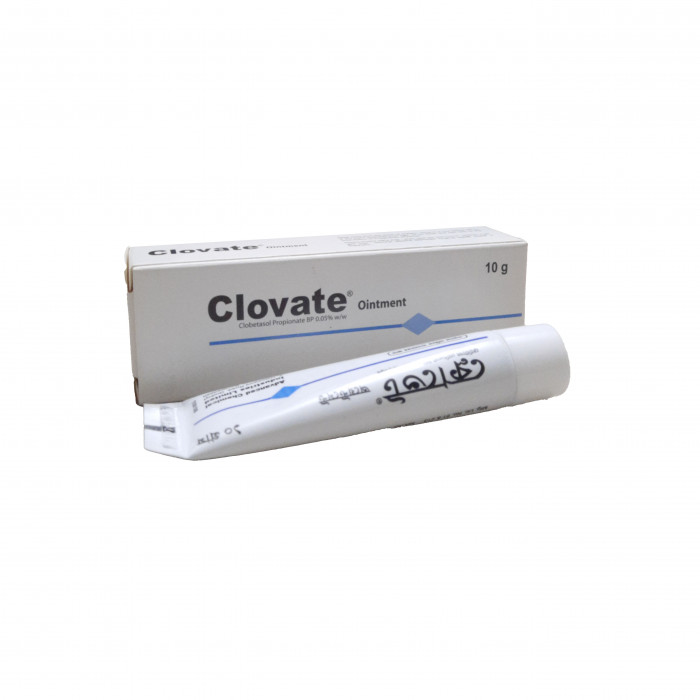
✔ 100% Authentic Product
👁️ Currently Viewing 7346
Clovate 0.05% Ointment 10gm
Clovate 0.05% Ointment is a topical medication used to treat skin conditions such as psoriasis (a skin condition that results from abnormal immune activity and causes dry, itchy, and scaly skin due to the buildup of skin cells), dermatitis (skin irritation), and eczema (skin becomes dry, itchy, red, and bumpy). The way this medication works is by reducing the amount of substances your body produces. It lessens the redness and swelling on your skin as a result.
Discount
Price: ৳ 65
MRP:
৳
68.2
5%
Off

100% Genuine Products, Guaranteed

Safe & Secure Payments, Always

Fast, Secure & Efficient Delivery

Proper Packaging
 Cash on Delivery - All over Bangladesh
Cash on Delivery - All over Bangladesh Regular Delivery - 12-24 Hours, Dhaka City* Charge Tk.39-59
Regular Delivery - 12-24 Hours, Dhaka City* Charge Tk.39-59 Regular Delivery - 24-48 Hours, Other Cities* Charge Tk.99-110
Regular Delivery - 24-48 Hours, Other Cities* Charge Tk.99-110
 ফ্রি ডেলিভারিঃ - ৯৯৯ টাকা+ অর্ডারে, ঢাকা
শহরে
ফ্রি ডেলিভারিঃ - ৯৯৯ টাকা+ অর্ডারে, ঢাকা
শহরে ফ্রি ডেলিভারিঃ - ২৯৯৯ টাকা+ অর্ডারে, ঢাকার
বাহিরে
ফ্রি ডেলিভারিঃ - ২৯৯৯ টাকা+ অর্ডারে, ঢাকার
বাহিরে
100% Genuine Products, Guaranteed
Safe & Secure Payments, Always
Fast, Secure & Efficient Delivery
Proper Packaging
 Cash on Delivery - All over Bangladesh
Cash on Delivery - All over Bangladesh Regular Delivery - 12-24 Hours, Dhaka City* Charge Tk.39-59
Regular Delivery - 12-24 Hours, Dhaka City* Charge Tk.39-59 Regular Delivery - 24-48 Hours, Other Cities* Charge Tk.99-110
Regular Delivery - 24-48 Hours, Other Cities* Charge Tk.99-110 ফ্রি ডেলিভারিঃ - ৯৯৯ টাকা+ অর্ডারে, ঢাকা
শহরে
ফ্রি ডেলিভারিঃ - ৯৯৯ টাকা+ অর্ডারে, ঢাকা
শহরে ফ্রি ডেলিভারিঃ - ২৯৯৯ টাকা+ অর্ডারে, ঢাকার
বাহিরে
ফ্রি ডেলিভারিঃ - ২৯৯৯ টাকা+ অর্ডারে, ঢাকার
বাহিরে
✅ Description:
Clovate 0.05% Ointment contains Clobetasol, which is a topical corticosteroid used to treat inflammatory skin conditions such as psoriasis, eczema, and dermatitis in adults and adolescents (aged 12 years or above). These conditions are characterized by redness, itching, and skin rashes that may not have responded to milder steroid creams or ointments.
Psoriasis is an immune-mediated skin disease that accelerates the growth cycle of skin cells, resulting in thick red patches with silvery scales. It commonly affects areas like elbows, knees, scalp, lower back, face, palms, and soles, although it can occur elsewhere. Eczema, also known as dermatitis, encompasses various types of skin inflammation that cause dry, itchy skin and rashes, typically seen on the face, inside the elbows, behind the knees, and on the hands and feet. Scratching the affected areas can exacerbate redness, swelling, and itching.
Clovate 0.05% Ointment is not suitable for patients with other bacterial, fungal, or viral infections, such as herpes simplex, chickenpox, and tuberculosis. Before using Clovate 0.05% Ointment, it is important to inform your doctor if you have a skin infection, diabetes, adrenal gland issues, scheduled surgery, acne, plaques in specific areas like the mouth, underarms, anus, or genitals, or liver diseases.
The use of Clovate 0.05% Ointment during pregnancy should only be considered if recommended by your doctor. Breastfeeding women should use caution when using Clovate 0.05% Ointment. It is not recommended for use in children under 12 years of age.
Common side effects of Clovate 0.05% Ointment include thinning of the skin, dilation of small veins in the skin, skin discomfort, and dryness. If any of these symptoms worsen or persist, it is important to contact your doctor.
Remember to follow your doctor's instructions and consult them if you have any concerns or if your symptoms worsen while using Clovate 0.05% Ointment.
Safety Advices

Alcohol
No interaction found/established

Pregnancy
CONSULT YOUR DOCTOR
Clovate 0.05% Ointment should be used during pregnancy only if recommended by your doctor. Consult your doctor before using Clovate 0.05% Ointment. Pregnant women should consult a doctor before using Clovate 0.05% Ointment.

Breastfeeding
CAUTION
Clovate 0.05% Ointment should be used with caution by breastfeeding women. Consult your doctor before using Clovate 0.05% Ointment.

Driving
No interaction found/established

Kidney
No interaction found/established

Liver
No interaction found/established
✔️ Uses of Clovate 0.05% Ointment
- Treats inflammatory conditions of the skin such as psoriasis, eczema, dermatitis, etc
✔️ How does Clovate 0.05% Ointment work?
Clovate 0.05% Ointment is a topical corticosteroid that possesses anti-itching, anti-inflammatory, and vasoconstrictive properties. It works by inhibiting the release of specific chemical mediators, such as prostaglandins and leukotrienes, which are involved in pain, inflammation, and swelling processes in the body. By reducing the levels of these mediators, the cream helps alleviate symptoms such as skin redness, itching, inflammation, swelling, and irritation that are associated with certain skin conditions.
✔️ Side Effects of Clovate 0.05% Ointment
- Burning sensation at the application site
- Dry skin
- Redness of skin
- Itching of skin
✔️ Quick Suggestions:
- Clovate 0.05% Ointment is used to treat redness, swelling, itching, and discomfort associated with various skin conditions. It should be applied to the affected areas as a thin film two or three times daily, or as advised by your doctor. It's important not to use it more often or for longer than recommended by your doctor. Avoid covering the treated area with airtight dressings, unless directed by your doctor, to reduce the risk of side effects. If you suspect an infection, stop using Clovate and consult your doctor. If your skin condition does not improve after four weeks of treatment, consult your doctor again. Do not use Clovate 0.05% Ointment for more than four consecutive weeks at a time.
- Diet tips: Including certain foods in your diet can support skin health. Foods rich in quercetin, such as apples, cherries, broccoli, spinach, and blueberries, may be beneficial. Quercetin is a flavonoid known for its anti-inflammatory properties. Consuming foods rich in probiotics can help in developing a healthy immune system against allergies. However, it's important to note that individual dietary needs may vary, so consulting a healthcare professional or a registered dietitian can provide personalized advice.
- Allergenic foods: Limiting the intake of foods that might trigger allergies can be beneficial. Some common allergenic foods include dairy products, soy, eggs, and nuts. If you suspect any specific food allergies, it's best to consult an allergist for appropriate testing and guidance.
- Sugar and inflammation: Excessive sugar consumption may contribute to inflammation. It is generally recommended to limit the intake of foods high in added sugars for overall health, including skin health.
- Healthy diet: Including a variety of fruits, vegetables, whole grains, healthy fats, and fish in your diet can provide essential nutrients that support skin health. These foods are generally considered part of a balanced and healthy diet.
- Skin irritants: Avoiding contact with harsh soaps, detergents, and rough fabrics can help prevent skin irritation and discomfort.
✔️ Indication of Clovate 0.05% Ointment
Clobetasol Propionate is prescribed for the treatment of various dermatoses in adults, elderly individuals, and children over the age of These dermatoses include:
- Psoriasis: Clobetasol propionate is effective in treating psoriasis, particularly in cases where widespread plaque psoriasis is not present.
- Recalcitrant dermatoses: This refers to stubborn or resistant skin conditions that have not responded well to other treatments. Clobetasol propionate is used to manage these challenging dermatoses.
- Lichen planus: Clobetasol propionate is utilized in the treatment of lichen planus, an inflammatory skin condition characterized by itchy, flat-topped papules.
- Discoid lupus erythematosus: Clobetasol propionate may be prescribed for discoid lupus erythematosus, a chronic autoimmune skin disease causing disc-shaped lesions on the face, scalp, and other areas.
- Other skin conditions: Clobetasol propionate is also employed when other less potent corticosteroids have not provided satisfactory results in the treatment of various skin conditions.
✔️ Pharmacology
Clobetasol Propionate is a potent topical corticosteroid that is commonly used to treat various skin conditions. It exerts its therapeutic effects through its anti-inflammatory, vasoconstrictive, and antipruritic properties. Here are some additional details:
- Vasoconstrictor: Clobetasol propionate can help constrict blood vessels in the skin, which can reduce redness and inflammation associated with certain skin conditions.
- Anti-inflammatory: As a corticosteroid, clobetasol propionate has potent anti-inflammatory properties. It works by suppressing the immune response, reducing inflammation, and alleviating symptoms such as redness, swelling, and itching.
- Antipruritic: Clobetasol propionate also has antipruritic properties, meaning it helps to relieve itching and discomfort associated with skin conditions.
- Late-phase allergic reactions: Clobetasol propionate can prevent or reduce the occurrence of late-phase allergic reactions. Late-phase reactions involve the recruitment of various immune cells, such as eosinophils and mast cells, to the affected area. By reducing chemotaxis (migration of immune cells), eosinophil activation, and mast cell density, clobetasol propionate helps alleviate the allergic response.
- Inhibition of cytokine production and arachidonic acid metabolism: Clobetasol propionate inhibits the production of cytokines, which are inflammatory mediators involved in the immune response. Additionally, it inhibits the metabolism of arachidonic acid, a fatty acid involved in the production of inflammatory molecules called prostaglandins. By reducing cytokine production and inhibiting arachidonic acid metabolism, clobetasol propionate contributes to its anti-inflammatory effects.
✔️ Dosage & Administration of Clovate 0.05% Ointment
- Application: Apply a thin layer of Clobetasol Propionate cream or ointment to the affected skin areas twice daily. Gently and completely rub it into the skin.
- Short courses and exacerbations: Repeated short courses of Clobetasol Propionate may be used to control exacerbations of the skin condition. This means that you can use it again if symptoms worsen or reappear after a period of improvement.
- Hyperkeratosis and occlusion: In more resistant lesions (areas of the skin with thickened outer layers), especially if there is hyperkeratosis (excessive skin scaling or thickening), the effect of Clobetasol Propionate can be enhanced by occluding the treatment area with polythene film. Occlusion refers to covering the treated area with a plastic film to increase the absorption and effectiveness of the medication. Overnight occlusion is usually sufficient to achieve a satisfactory response.
- Treatment duration: Clobetasol Propionate is a super-high potency topical corticosteroid, so treatment should be limited to 2 consecutive weeks. It's important not to use it for longer periods without medical supervision, as prolonged use of high-potency corticosteroids can increase the risk of side effects.
- Maximum weekly dose: The maximum weekly dose of Clobetasol Propionate should not exceed 50 grams per week. It's important to follow this dosage limit to minimize the potential for systemic absorption and associated side effects.
- Children: In the case of children, it is generally recommended to limit treatment courses, if possible, to five days. Regular review by a healthcare professional is advisable to monitor the treatment's effectiveness and assess any potential risks or side effects.
It's important to note that these guidelines are a general summary and should not replace the specific instructions provided by a healthcare professional. Always follow your doctor's advice and consult them if you have any questions or concerns about the use of Clobetasol Propionate or any other medication.
✔️ Interaction
Clobetasol propionate may experience increased systemic exposure when used concurrently with CYP3A4 inhibitors such as ritonavir and itraconazole. It is important to be cautious in such cases. When neomycin sulfate is systemically absorbed in significant amounts, it can enhance and prolong the respiratory depression caused by neuromuscular blockers. However, when neomycin sulfate is used as directed, its systemic exposure is expected to be minimal, and the likelihood of significant drug interactions is low.
✔️ Contraindications
The drug is contraindicated in rosacea, acne vulgaris, and perioral dermatitis, primary skin viral infections (for example, herpes simplex, chickenpox), and those who are allergic to the preparation.
✔️ Pregnancy & Lactation
Information regarding the safety of clobetasol in pregnant women is not available. However, published data suggest a higher risk of low birth weight when using potent or very potent topical corticosteroids exceeding 300 grams during pregnancy. It is important to inform pregnant women about the potential risk to the fetus and advise them to use clobetasol on the smallest skin area and for the shortest duration possible.
Animal studies have shown an increased occurrence of malformations such as cleft palate and skeletal abnormalities when clobetasol was administered subcutaneously to pregnant mice and rabbits.
There is no available information about the presence of clobetasol in breast milk or its effects on breastfed infants or milk production. Systemic corticosteroids, when taken orally, can be found in human milk and may affect growth, interfere with natural corticosteroid production, or cause other adverse effects. It is unknown if the topical use of clobetasol can lead to sufficient absorption into human milk. To minimize potential exposure to the breastfed infant through breast milk, it is advised to use clobetasol on the smallest skin area and for the shortest duration while breastfeeding. Additionally, breastfeeding women should avoid applying clobetasol directly to the nipple and areola to prevent direct exposure to the infant.
✔️ Precautions & Warnings
- Before using Clovate 0.05% Ointment, it is important to inform your doctor about any previous allergic reactions you may have had with other steroids. If an overdose occurs, clean the area thoroughly and reapply the medicine as directed.
- When applying the medication near the eyes or on the eyelids, exercise caution to prevent the drug from entering the eyes frequently. This is because prolonged exposure to corticosteroids like clobetasol may increase the risk of developing cataracts or glaucoma. If you experience any vision problems or abnormal signs, notify your doctor immediately.
- Clovate 0.05% Ointment can be easily absorbed by the skin, and repeated application may lead to skin thinning. Therefore, it is important to apply the cream carefully, especially on broken or damaged skin and when treating large areas of the body. If you notice any skin thinning or other skin changes, consult your doctor.
- Avoid using Clovate 0.05% Ointment simultaneously with other creams or ointments, such as moisturizers. Allow at least 30 minutes between the application of clobetasol and any other product to avoid potential interactions.
✔️ Storage Conditions
Store below 25°C temperature. Do not freeze. Keep out of reach of children.
⚠️Disclaimer:
At ePharma, we’re committed to providing accurate and accessible health information. However, all content is intended for informational purposes only and should not replace medical advice from a qualified physician. Please consult your healthcare provider for personalized guidance. We aim to support, not substitute, the doctor-patient relationship.





